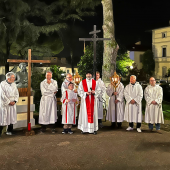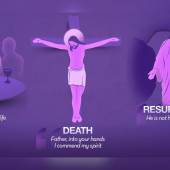Father, in your hands I commend my spirit
Good Friday: April 15, 2022
The Passion of the Lord
Isa 52:13-53:12/Psa 31:2, 6, 12-13, 15-17, 25/Heb 4:14-16; 5:7-9/John 18:1- 19:42
Today is Good Friday or Friday of the Holy Week. No Holy Mass is celebrated today because it is the day in which the Son of God chose to die and surrender his Spirit to God the Father. One expected the Son of God to be a real hero in filmy style but in Jesus we had a hero dying on the Cross. Palm Sunday celebrations ignited some kind of hope but it all ended up miserably. The Jews of Jesus’ time expected a political and Royal Messiah but as the First Reading from the Book of Isaiah narrates, the Messiah they got was a Suffering Servant who came to atone for the sins of the people. Sufferings entered the world because of the sins of humanity and someone sinless had to die in order to remove the stains of sins. Therefore, the same Suffering Servant was destined to become the Redeemer of the world in the person of Jesus. As St. Paul writes in 1 Cor 5:19, “in Christ God was reconciling the world to himself”.
The First Reading from the Book of Isaiah 52:13--53:12 is called the Fourth Song of the Suffering Servant. He suffered not for his sins, not for his infidelity and not for breaking the Covenant. His sufferings were redemptive. His death was redemptive. That is why, when we make the Way of the Cross, we keep repeating very prayerfully: We adore you O Christ and we praise you because by your Holy Cross, you have redeemed the world! Towards the end of the first reading, we hear that the Suffering Servant was a prayerful person who took upon himself all the sins of the world. Yes! Prayer is part and parcel of our lives. The moment we stop praying the communication between God and humanity is cut off. Only the Cross of Jesus has the graceful capacity to bridge the gap.
Our response to the Responsorial Psalm asks us to repeat those final words of Jesus on the Cross, “Father, in your hands I commend my spirit”. These are words of utter surrender and refuge.
The Second Reading from the Letter to the Hebrews picks up the theme of prayer with which the First Reading ended. The author of the Hebrews says, “In the days of his flesh, Jesus offered up prayers and supplications, with loud cries and tears, to the one who was able to save him from death, and he was heard because of his reverent submission. Although he was a Son, he learned obedience through what he suffered; and having been made perfect, he became the source of eternal salvation for all who obey him” (Heb 5:7-9).
The long Gospel narration finds Jesus in a web of an unjust human and religious structures of the Jewish society of Jesus’ time. Every system of human justice failed in the case of Jesus. The writer of the Gospel tells us that right from the beginning, Jesus was aware of what was going on around him and what is going to come. He was not taken by surprise. Jesus reveals himself as “I AM,” “Ego Eimi” in Greek which should have reminded every Jew of God’s Self-revelation to Moses on Mount Horeb in the Book of Exodus 3:11. That is why the soldiers fell prostrate before Jesus and paid their homage. The soldiers knew for sure that Jesus is God.
The question of Jesus when Peter cut the right ear of Malchus reminds all the readers and listeners of the Gospel of John that Jesus was born to fulfill the plan of God for him. Yes! Jesus was born to drink the cup that the Father had given him. It is worth recalling the question of Jesus to James and John, the sons of Zebedee who requested Jesus if they could occupy the seats on his right and left when he comes in glory in Mark 10:38, “You do not know what you are asking. Are you able to drink the cup that I drink, or be baptized with the baptism that I am baptized with?” The cup that Jesus spoke about refers to the sufferings that he would go through.
The prophecies of Jesus have started becoming a reality one by one. Judas Iscariot has already betrayed Jesus and now Peter is going to deny him three times. Unfortunately all those who questioned about Peter’s relationship with Jesus turned out to be a woman and one of the servants according to Johannine narrative. They are all people from the lower strata of the Jewish society. It is to them that Peter denied having any contact with Jesus. Denial is a denial whether it is to a person of higher strata or lower but what is more important is that Peter deeply repented about his grave fault.
Judas Iscariot betrayed. Peter denied and now the crowd had to make a choice between Jesus of Nazareth known for his miracles and signs and Jesus Barabbas, a notorious criminal. The crowed chose the criminal to be released instead of the innocent and holy soul Jesus. The crowed had to make one more choice: Jesus of Nazareth king of the Jews and Caesar the Roman Empeor. They chose the Roman. Pilate turned out to be a coward. It is all because the Scriptures had to be fulfilled. But then ironically Pilate would reiterate the fact that Jesus of Nazareth was indeed the King of the Jews even if the Jews would not approve of his Kingship and the Jewish authorities argued in favour of certain modifications.
One of the specialities of Johannine account of the Passion Narratives is the new affiliation or rather a new web of relationship that Jesus created before giving up his life. He asked his mother to accept John as her son, through whom the entire humanity would become her sons and daughters while he handed over his mother as John’s mother and thus she becomes the mother of the entire human race. Once Jesus finds that everything is accomplished, he gives up his spirit. Nicodemus renders his hand in anointing of the body of Jesus with his contribution while Joseph of Arimathea assures an honourable burial to the Son of God.
At the end of this reflection, let us carry home the following points for our reflections:
- The incarnation of Jesus demanded his whole hearted participation the lives and life situations of humanity. Through his passion and death, Jesus assured the human race that he is with us always. Are we with him?
- Endurance and perseverance are the keys of success in times of trials and tribulations. Are we patient enough to endure and persevere in order to die and rise to life?
- Good Friday events very much resemble the struggles of humanity down the centuries. All those who participate in them will certainly find meaning and meaningfulness in life. How do I make the celebrations of today a meaningful to me?
Radio Veritas Asia (RVA), a media platform of the Catholic Church, aims to share Christ. RVA started in 1969 as a continental Catholic radio station to serve Asian countries in their respective local language, thus earning the tag “the Voice of Asian Christianity.” Responding to the emerging context, RVA embraced media platforms to connect with the global Asian audience via its 21 language websites and various social media platforms.














